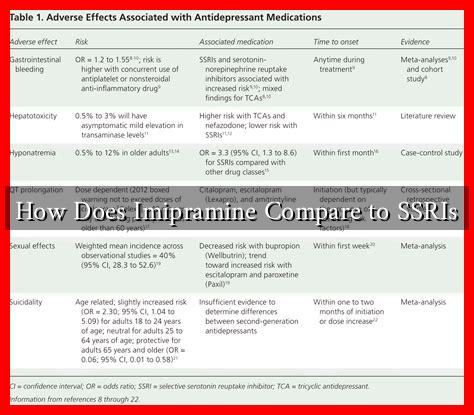-
Table of Contents
How Does Imipramine Compare to SSRIs?
Imipramine, a tricyclic antidepressant (TCA), has been a staple in the treatment of depression since its introduction in the 1950s. In contrast, selective serotonin reuptake inhibitors (SSRIs) have gained popularity since the 1990s due to their favorable side effect profile. This article explores the differences, similarities, and clinical implications of using imipramine compared to SSRIs in treating depression and anxiety disorders.
Understanding Imipramine and SSRIs
Imipramine works primarily by inhibiting the reuptake of norepinephrine and serotonin, leading to increased levels of these neurotransmitters in the brain. SSRIs, on the other hand, specifically target serotonin reuptake, making them more selective in their action.
Mechanism of Action
- Imipramine: Inhibits the reuptake of both serotonin and norepinephrine, which can enhance mood and alleviate anxiety.
- SSRIs: Primarily block the reuptake of serotonin, which is thought to improve mood with fewer side effects related to norepinephrine.
Effectiveness in Treating Depression
Both imipramine and SSRIs have been shown to be effective in treating major depressive disorder (MDD). However, their efficacy can vary based on individual patient characteristics.
Clinical Studies and Statistics
Research indicates that:
- A meta-analysis found that TCAs, including imipramine, are effective for severe depression, with response rates around 60-70%.
- SSRIs have a similar efficacy, with response rates ranging from 50-65% for mild to moderate depression.
However, imipramine may be more effective for patients with treatment-resistant depression, as noted in a study published in the Journal of Clinical Psychiatry.
Side Effects and Tolerability
One of the most significant differences between imipramine and SSRIs lies in their side effect profiles.
Common Side Effects
- Imipramine:
- Weight gain
- Dry mouth
- Constipation
- Cardiovascular issues (e.g., arrhythmias)
- SSRIs:
- Nausea
- Sexual dysfunction
- Insomnia
- Weight changes
While SSRIs are generally better tolerated, imipramine may be preferred in certain cases, particularly when patients have not responded to SSRIs or when they exhibit specific symptoms that may benefit from the broader action of TCAs.
Considerations for Use
When deciding between imipramine and SSRIs, several factors should be considered:
- Patient History: Previous treatment responses can guide the choice of medication.
- Severity of Symptoms: Imipramine may be more suitable for severe cases.
- Side Effect Tolerance: Patients with a history of adverse reactions to TCAs may be better suited for SSRIs.
Conclusion
In summary, both imipramine and SSRIs are effective treatments for depression, but they differ significantly in their mechanisms of action, side effect profiles, and suitability for various patient populations. Imipramine may be more effective for severe or treatment-resistant depression, while SSRIs are often preferred for their tolerability and safety. Ultimately, the choice between these medications should be individualized, taking into account the patient’s history, symptom severity, and potential side effects. As always, consultation with a healthcare provider is essential for making informed treatment decisions.

